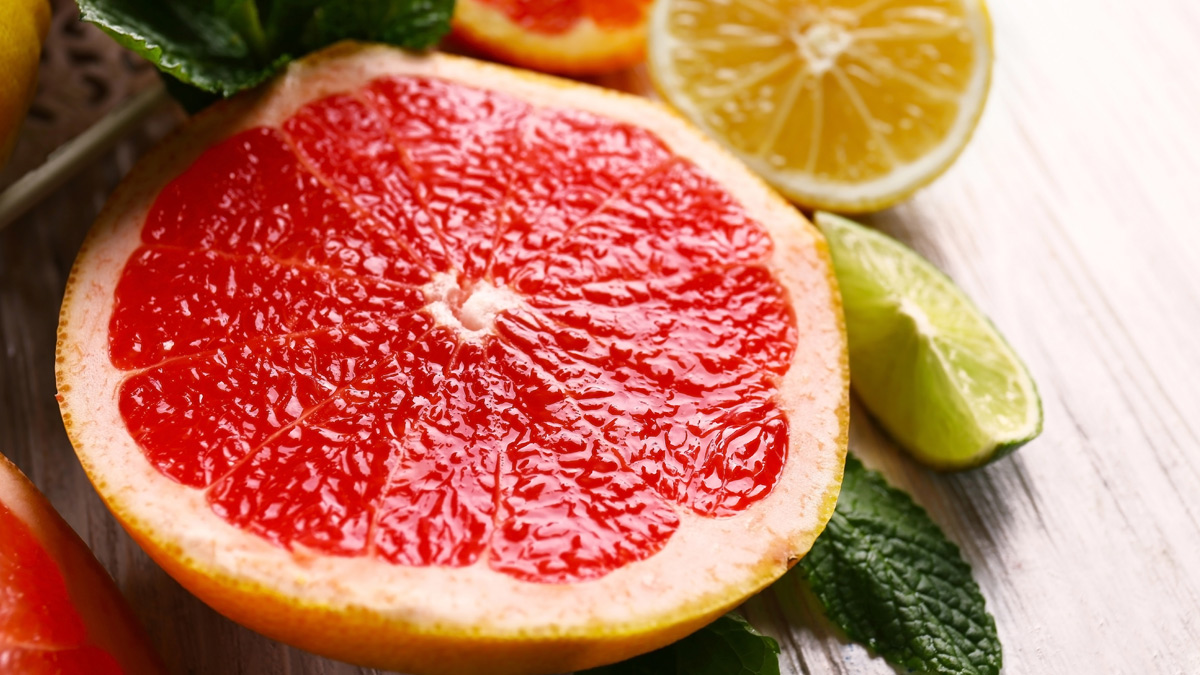Five health benefits of citrus fruits
Winter is the season for citrus fruits. Oranges, clementines, mandarins, lemons, grapefruit … these fruits not only provide beautiful summer colours and refreshing flavours but also a wide range of health virtues. Read on to find out more about the benefits of citrus fruits!

A wealth of vitamins
Citrus fruits occupy an important place among the natural remedies recommended during the winter season. Their bright summer colours enliven the dark days of winter. Their sharp flavour adds zest to cooking. And most importantly, they provide us with vitamins that benefit our health and well-being. These fruits go a long way to meeting our needs for vitamin C, an essential nutrient known for its immune-stimulant effect. A particular characteristic of these types of fruit is that they also contain vitamin A precursors such as beta-cryptoxanthin. Present in satsumas and other citrus fruits, beta-cryptoxanthin is converted in the body into vitamin A, a nutrient necessary for healthy vision and immune defences.
A concentrate of protective antioxidants
As well as being vitamin-rich, citrus fruits also contain powerful protective agents called antioxidants. These natural substances defend the body by quenching excess free radicals, highly reactive elements that cause considerable damage at a cellular level. This protective action helps prevent the development of certain diseases and also combats the ageing process. However, antioxidants are often concentrated in parts of the citrus fruit that are seldom eaten. Such is the case with naringin, significant levels of which are found in grapefruit peel. The good news is that in order to make naringin’s benefits available, it is extracted for use in nutritional supplements, such as in the product Grapefruit Extract.
Natural aids to weight loss
‘Lose weight with lemons’, ‘Lemon diet for rapid weight loss’, ‘Slim down with grapefruit’ … the slimming properties of citrus fruits regularly grab the headlines in magazines devoted to natural health and well-being. There are several reasons why citrus fruits are so popular with slimmers. Firstly, they contain natural fibre which supports intestinal transit, facilitates the elimination of fat and promotes a feeling of satiety. Secondly, certain polyphenols found in citrus fruits have a fat-burning action which can help speed up weight loss. Thirdly, citrus fruits are low in calories which makes them an attractive choice for those wishing to lose weight naturally. As a result of their many benefits for weight loss, citrus fruits are used in the development of slimming supplements such as the product Metadrine™.
Powerful detoxifying action
Lemons are the detox stars of the citrus fruit family; indeed lemon water is often hailed as a miracle cure for ‘the day after’. Excess food and drink place the body under considerable strain and lemon juice helps drain the gallbladder, stimulate bile production and cleanse the liver. The detoxifying effect of this fruit helps eliminate toxins which have accumulated in the body and restore digestive health. However, the acidity of the fruit means that excessive consumption may produce unwelcome effects in some people, which is why other detox solutions are often used.
Strong cardio-protective potential
Citrus fruits have also attracted scientific interest for their heart-protective properties which several studies have shown help prevent cardiovascular diseases such as atherosclerosis and hypertension. Researchers believe this cardio-protective effect may be related to a cholesterol-lowering action. In other words, certain of the active principles in citrus fruits may help reduce levels of total cholesterol. This major discovery has resulted in the development of cardio-protective supplements such as Sytrinol™, a natural alternative for treating hypercholesterolemia (high blood cholesterol).
21 Hours
Very good experience
Very good experience, the products arrived in time, in perfect condition and are good quality. Thank you.
GABI TIRCOCI
6 Days
very good expereince
very good expereince
Jelena Đaković
6 Days
Very good products.
Very good products.
Agnes BENDSAK
8 Days
Just OK
Just OK, ordering from company for many years and being safisfied
Lynn Mae
9 Days
Recomendo
Produtos encomendados são recebidos atempadamente e de acordo com o anunciado! Muito satisfeita!
Carla Sofia
10 Days
Everything is great!
Everything is great!
Jonas
14 Days
The delivery was fast and the product…
The delivery was fast and the product is great
SOMMARIVA Gianni
16 Days
Great service and lots of information
Great service and lots of information
Gabi
19 Days
Service Satisfaction
I’m satisfied with the service; it fulfilled what it set out to do.
Anfhony Abreu
22 Days
Original product and fast delivery
Original product and fast delivery. I haven't started it yet, but will do soon.
Vincenza Catania
24 Days
Good quality
Good quality. Good service.
Leonel Guzman
26 Days
Top!!!!!!!!
Top!!!!!!!!
Michael
28 Days
Excellent!
Products are great and delivered fast!
PARDINI Debora
29 Days
From order to receive the product
From order to receive the product, the process is smooth & fast. It’s good to customers.
WONG Mei Ling
30 Days
Fast delivery
very quick delivery to italy. product is good.
Customer
of experience
your money back
##montant## purchase




